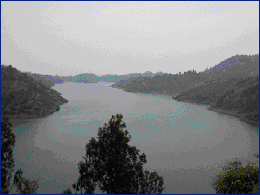 Environment Environment |
Like other African Countries, Rwanda faces unsustainable
spiral of growing population, decreasing per capita
food supplies and worsening environmental degradation.
The critical links here are chronic poverty, a productive
sector dominated by subsistence agriculture, and
fuel food as the primary source of domestic energy.
In addition, over cropping and over grazing destroy
vast tracts of tropical forests, thereby contributing
to soil erosion and desertification. In Rwanda,
this baseline of environmental degradation has been
severely exacerbated by conflict and the attendant
large, repeated displacements of population, as
well as the need to permanently resettle millions
of returnees since 1994.
National strategies In Rwanda, issues of environmental
protection are implicated only indirectly, within
the overall strategies for transformation of the
productive sector (including creation of off-farm
employment), improving food security and transforming
Rwanda's traditional patterns of human settlement.
 |
LAKE KIVU
National action plan in 1996, the National Environmental
Action plan was revised, and a draft strategy produced.
A national policy paper on water was produced as
a legal framework. Since 1997, the Rwanda Government
has been elaborating a National strategy and plan
of Action on Biodiversity (BSAP) setting targets
and priorities in line with other global recommendations.
In 1999, the Government, in cooperation with the
European Union drafted an action plan for reforestation.
Regional cooperation Rwanda is part of regional
development. Initiative such as the Nile Basin Co-operative
framework, and the Development of a Regional Strategic
Action plan for Environmental and Biodiversity Resources
of Congo Basin Eco-Systems. For instance, the Nyungwe
forest and Volcano Park fall within regional frameworks
for environmental protection and cooperation including
the International Gorilla Conservation programme.
Since 1970, there has been an institutional framework
for Akagera Basin Riparian Countries for a better
use of resources common for those countries.
|

